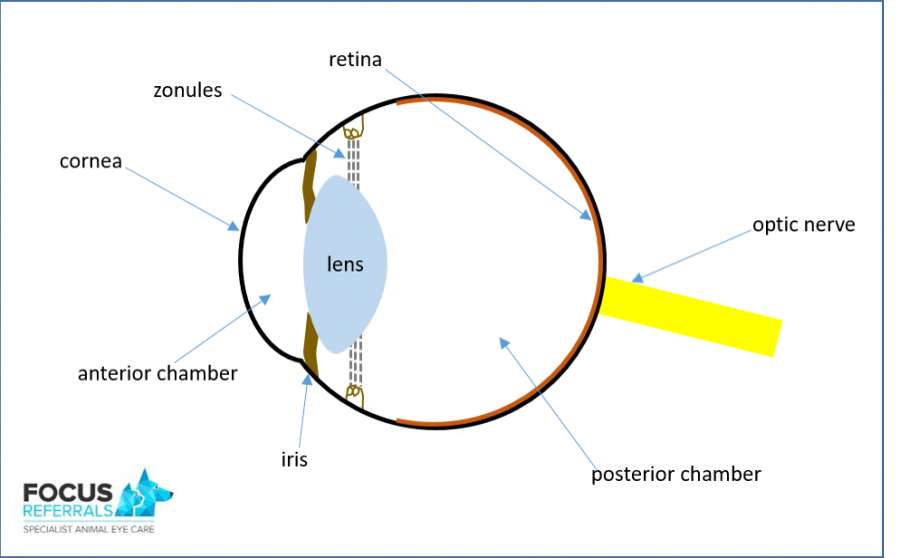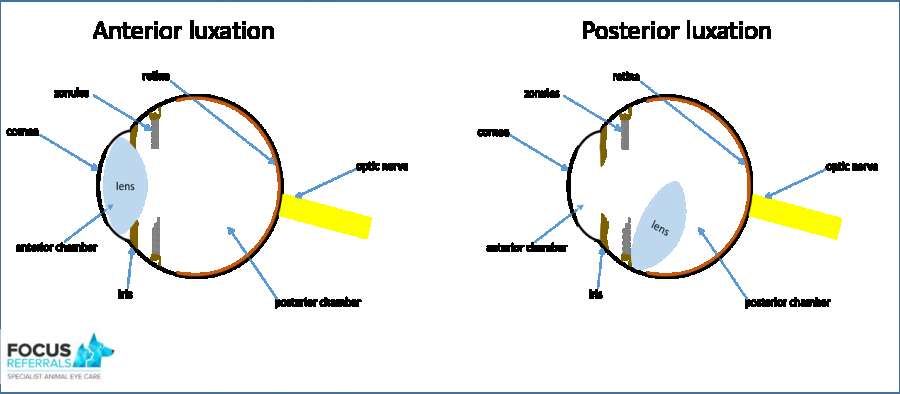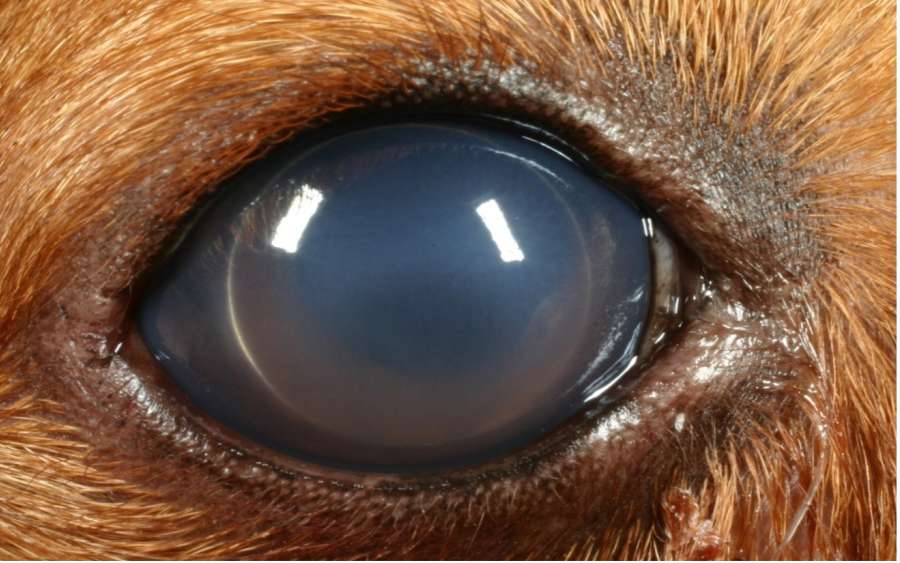Lens Luxation
What is the lens?
The lens is a transparent (clear) structure within your dog’s eye. It sits just behind the pupil (black hole at the centre of the coloured iris). As light enters through the pupil, the lens focuses it onto the retina (back of the eye).
Small fibres called ‘zonules’ hold the lens in position.

What is lens luxation?
If the zonules weaken or break, the lens moves into either the anterior chamber (front) or posterior chamber (back) of the eye.
In either position, the trapped lens causes fluid to build up within the eye leading to glaucoma (high pressure). Damage to the retina (back of the eye) occurs if the lens falls into the posterior chamber. Without treatment, the retina can even detach from the eye causing irreversible damage.
Both glaucoma and retinal detachment can lead to blindness.


Causes of lens luxation
Most cases of lens luxation are hereditary (passed from parents to puppies) and caused by weakened zonules. This form of primary lens luxation most commonly affects small terrier breeds including:
- Miniature Bull Terriers
- Smooth and wired hair Fox Terrier
- Lancashire Heelers
- Parson Russell Terriers
Border Collies may also inherit a higher likelihood of developing primary lens luxation.
Secondary lens luxation affects both cats and dogs and can be a consequence of another eye disease. Glaucoma (high pressure within the eye), cataracts, uveitis (inflammation within the eye) and eye tumours (growths) all damage the zonules causing the lens to loosen and move.
Signs of lens luxation
Usually the signs of lens luxation develop quickly. It’s a very painful condition and causes sudden eye redness. Sometimes you might notice a blueish tinge to the cornea (clear surface of the eye). As pressure within the eye increases, your dog might seems depressed, quiet and reluctant to exercise.
Very high pressure within the eye damages the optic nerve (transmits signals from the eye to the brain) causing blindness.
Diagnosing lens luxation
Your vet will diagnose lens luxation by looking at your dog’s eyes with an ophthalmoscope (illuminated magnifying lens).
At Focus Referrals, we have specialist equipment to check your dog’s eyes in great detail. We can diagnose lens luxation even before the lens has moved out of position. Primary lens luxation usually affects both eyes so detecting it early gives us the best chance to treat your dog and preserve his/her vision.
What treatment is available?
Most dogs and cats with lens luxation need an operation to either remove the lens from their eye or reposition the lens within the eye. These procedures relieve high eye pressure and reduce the risk of your dog or cat becoming blind.
Medical management alone is also possible if the disease is caught in the early stages.
Lens luxation surgery at Focus Referrals
Your pet will spend the day with us as an inpatient. We fully examine your pet on the morning of surgery to make sure they’re well enough for their operation.
We use a special nerve block injection behind the eye to keep your pet’s eye completely still during surgery. While your pet is asleep, we control their breathing and carefully monitor them throughout.
Our specialist ophthalmologist uses a state of the art operating microscope and microsurgical equipment to cut into the eye and gently remove the trapped lens or push the lens back behind the iris. We use tiny stitches to close the wound; you might not even notice them and they dissolve on their own within a few weeks.
What happens after surgery?
Your pet will need an intensive course of medicine (eye creams and oral medicine) to help their eye heal and prevent inflammation. They need to wear a buster collar for around 10 days to prevent them scratching or rubbing their eyes.
We’ll check your pet regularly after surgery to make sure they feel comfortable and that their eye is healing normally.
What are the possible complications?
The earlier we operate on your pet, the less likely they are to experience vision loss. Unfortunately, even after surgery, a dogs suffering from primary lens luxation become blind due to eye damage from the trapped lens.
Some pets require long term medication to control glaucoma even after their lens has been removed.
If you’d like to find out how Focus can treat your dog’s lens luxation, or for us to check your dog’s eyes, please ask your vet to get in touch with us.

